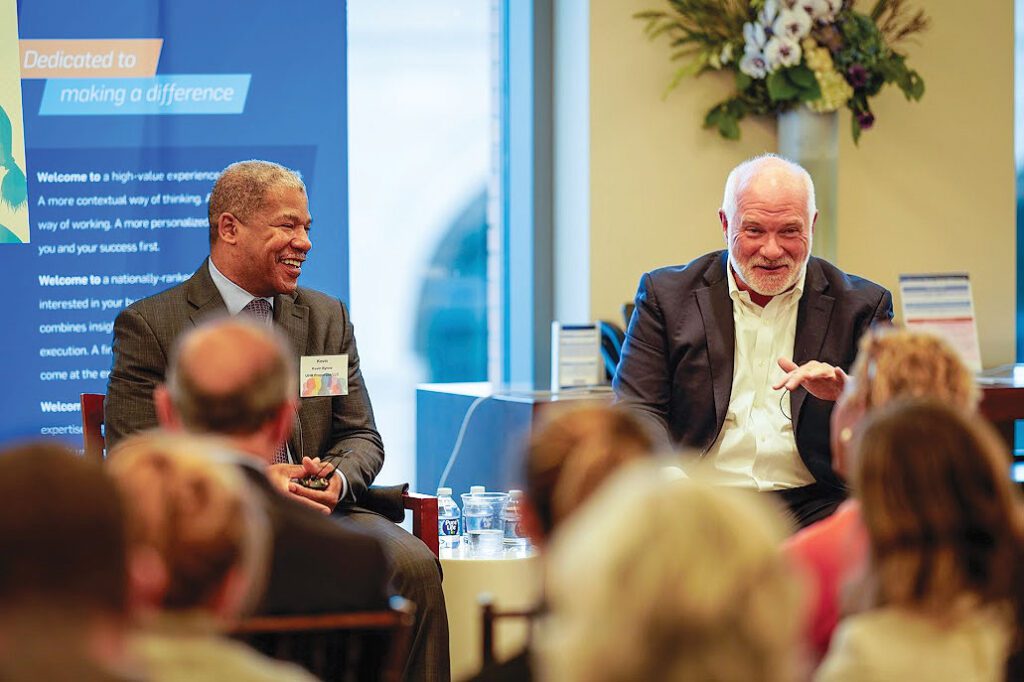
For many years, people of color from smaller development firms in Boston have attempted to cement partnerships with bigger companies in order to narrow the diversity gap in commercial real estate projects. Many were understandably frustrated by the lack of progress.
After George Floyd’s murder in 2020, concerted efforts were made to figure out how to engage these larger companies and to argue that diversity was good for business, with social and financial benefits. Many of those efforts have stalled post-pandemic, however, creating a desire to supercharge the initiatives.
Ten real estate organizations set out to explore changes in mindset and new ways to welcome smaller female- and minority-owned firms to meet with larger commercial real estate companies. From this collective effort, the Commercial Real Estate DEI Summit was born.
The focus of the daylong summit held Sept. 28 in the Seaport, led by Paul Ayoub of Nutter and Amanda Strong of MIT, was to discuss the Urban Land Institute’s 10 principles of embedding racial equity into commercial real estate planning. These include creating a community-centered development process, committing to optimizing institutional power, leveraging capital to institute change and forming strong intersectional partnerships.
The Urban Land Institute document recommends having larger firms use their institutional power to break down racial barriers. “Personal change requires deep internal work, and personal change leads to professional change,” the document says.
Shawn Barney, managing director of CLB Porter LLC, echoed that belief, saying, “Racism is a system of power, so I want people to use their power and their institutions to move the industry.”
Among the speakers was Taidgh McClory of THM advisors, a firm that works with commercial real estate companies to demystify racial equity in this field. He used the first part of his speech to highlight personal inequities he observed in his own life, focusing on his two grandfathers, one Black and one white.
Both were born in the 1920s, both were World War II vets, and both worked for General Electric in Lynn after the war, but their access to opportunity and power were vastly different. His white grandfather benefitted from the GI Bill, purchased a small home and built equity in it, and also from GE stock. His Black grandfather was unable to reap the benefits of stock or home ownership. He instead planted his family in public housing with no home equity or generational wealth.
McClory stated that while many use the proverbial “Rising tides lift all boats,” the old legacy system persists, with many people having no boats — and commercial real estate companies playing a big role in this problem.
But, he said, these companies have the power to change lives by embedding racial equity across all aspects of the real estate process and challenging the racial wealth gap that costs the economy more than $1.5 trillion over a 10-year period.
Kevin Bynoe of United Housing Management (UHM), a Black-owned property management company in Boston, described how his smaller firm was able to team up with the Lincoln Property Group, one of the largest developers of both residential and commercial real estate in the country.
When a bid came up for the property management of the Bolling Building in Nubian Square, Bynoe saw that the specifications said “firms needed 300,000-400,000 square feet of management experience for three years or more.” He called Scott Brown, executive vice president of Lincoln, to explore how they could form a partnership, and the partners were ultimately successful in winning the bid.
Bynoe credited the Massport Model with assisting him in meeting the Lincoln group. This model started in 2014 when Massport spelled out that bidders for Seaport development parcels needed to show that if selected, they would create partnerships with female- and minority-owned firms to develop the properties. The Omni Hotel on Summer Street, which brought in minority partners, is an example of the results.
Massport’s stipulation allowed UHM to arrange its first meetings with larger, more homogeneous companies like Lincoln to get a foot in the door. Bynoe met with Brown, and their collaboration continues to yield more work. His company has won a longer contract for the Bolling Building and bids for properties in West Roxbury housing stemming from his collaboration with Lincoln.
Bynoe said that the success of his partnership allows him to spend “60-70% of his discretionary spending on minority vendors …Those vendors will grow while we grow.”
Summing up the impact of the summit, Bynoe said, “There are now kids in the community that see people in Roxbury and Dorchester going to work every day — that is an impactful vision, and that’s what we need more of.”
The Bay State Banner was a sponsor of the Commercial Real Estate DEI Summit.







